ARTICLE AD BOX
Yolande Knell
Middle East correspondent
Reporting fromJerusalem

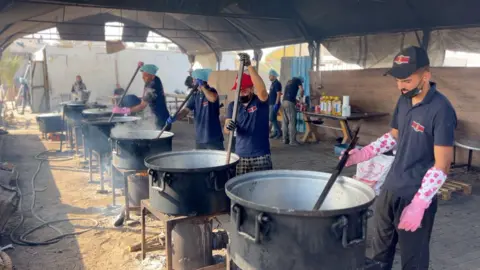 BBC
BBC
Anera's community kitchens in Khan Younis feeds some 6,000 people each day
A hot meal is hard to come by in the Gaza Strip, but a lunch for needy families in the south is about to be delivered by donkey and cart.
Today's dish is koshari - made with lentils, rice and a zesty tomato sauce - in a set of huge cooking pots in one of two community kitchens run by American Near East Refugee Aid (Anera), a US-based humanitarian organisation.
"People rely on our meals; they have no source of income to buy what's left in the local markets and many foods are not available," says Sami Matar, who leads the Anera team.
"In the past we used to cook rice with meat - with protein. Now, because of the closure, there's no type of meat, no fresh vegetables."

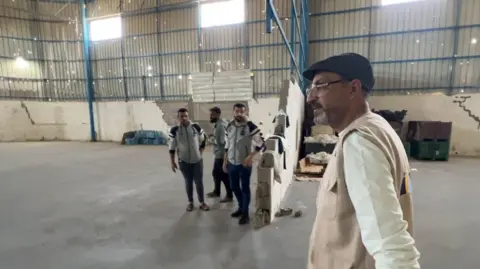
Sami Matar showed a local BBC journalist around the empty Anera warehouse
Two months ago, Israel shut all crossings to Gaza – preventing all goods, including food, fuel and medicines from entering - and later resumed its military offensive, ending a two-month ceasefire with Hamas. It said these steps were meant to put pressure on Hamas to release the hostages it still holds.
Recently, the UN's World Food Programme and Unrwa, the agency for Palestinian refugees, said they had used up all their stocks of food aid.
There is growing international pressure on Israel to lift its blockade, with warnings that mass starvation could be imminent and that intentionally starving civilians is a war crime.
"Aid, and the civilian lives it saves, should never be a bargaining chip," the UN's humanitarian chief, Tom Fletcher, warned on Thursday.
"Blocking aid starves civilians. It leaves them without basic medical support. It strips them of dignity and hope. It inflicts a cruel collective punishment. Blocking aid kills."

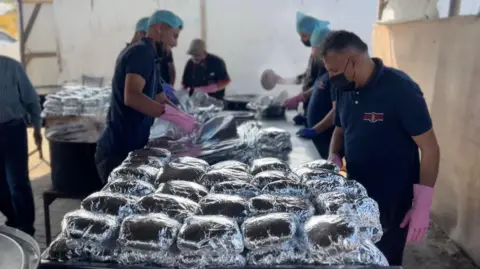
Hundreds of thousands of Palestinians are relying on community kitchens for their survival
Hundreds of thousands of Gazans depend on a few dozen remaining kitchens for sustenance. The one run by Anera in Khan Younis feeds some 6,000 people a day.
But if Israel does not lift its blockade, by far the longest it has ever imposed on Gaza, the kitchens - a last lifeline for so many - will soon have nothing to distribute. Food stockpiled during the ceasefire at the start of this year, has all but run out.
"The coming days will be critical. We expect we have two weeks' supply, maybe less," Mr Matar says as he shows a local BBC journalist around the vast, empty Anera warehouse.
"We used to receive more than 100 trucks every week - trucks of food parcels and hygiene kits. Now we don't have anything.
"We struggle to provide food such as rice, lentils, pasta, cooking oil and salt, for our community kitchens. It's very expensive to buy 1kg of wood and we need over 700kg a day for cooking."

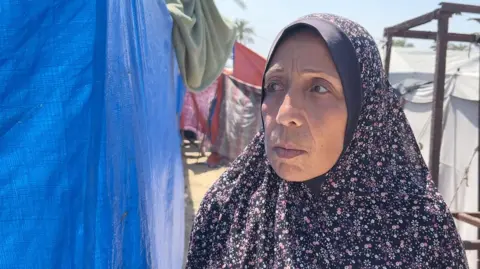
A displaced mother said there was no cooking gas or food to make meals for her family
Israel has accused Hamas of stealing and storing humanitarian aid to give to its fighters or sell to raise money. The UN and other agencies deny aid has been diverted and say that they have strict monitoring mechanisms.
"We work hard to avoid any interference from any parties. We have an accurate and strong distribution process," says Mr Matar, inspecting lists of aid recipients on his computer.
"We have a database of hundreds of thousands of people, including their names, ID numbers and addresses - the co-ordinates of the camps. This avoids duplication with the work of other non-governmental organisations and ensures transparency."
Back in the outdoor kitchen, Mr Matar tests the food from the steaming pots to check its quality. Parcels are wrapped up for distribution; each can serve up to four people.
All the workers receive food for their own hungry families.
The rest is soon transferred on the donkey cart through the bustling streets to al-Mawasi, a crowded tent camp for displaced people on the coast, where dozens of field monitors supervise the hand-out.
An elderly man walking with crutches looks relieved as he clutches two parcels of koshari to feed his family of seven. "Thank God, this will be enough," he says.
"Don't even ask me about the situation," he goes on. "We're only alive because death hasn't taken us yet. I swear I was searching for a loaf of bread since the morning, and I found none."

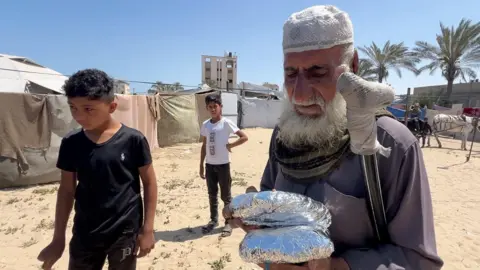
Each of the parcels of food can serve up to four people
"The situation is tragic, and it keeps worsening," comments a weary looking mother. "Life is humiliating here. We have men who are unable to work. There is no income, and all the products are so expensive. We're unable to buy anything."
"At this time, this is excellent," she says of the warm meal she has just been given. "Because there is no cooking gas, no food. When we want to have a cup of tea, I collect leaves to start a fire."
It has now been more than a year and a half since the war in Gaza began, triggered by the Hamas-led attacks on southern Israel. That assault killed around 1,200 people and more than 250 people were taken hostage. Some 59 are still held captive, with up to 24 of those believed to be alive.
Israel's military campaign has killed more than 52,400 people in Gaza, mostly women, children and the elderly, according to the Hamas-run health ministry. More than 90% of the 2.1 million population has been displaced - with many forced to flee multiple times.
The UN has warned that the current situation "is likely the worst it has been" due to the blockade, the renewed offensive and evacuation orders that have displaced some 500,000 people since 18 March.

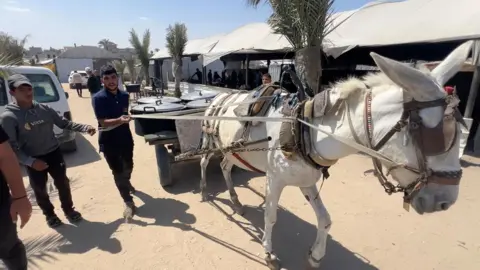
Anera distributes the food to tents in al-Mawasi rather than requiring people to queue for food at the kitchen
There is growing international pressure on Israel to lift its blockade, with warnings that intentionally starving civilians is a potential war crime. The UN says that Israel has a clear obligation under international law as an occupying power to allow and facilitate aid for Gazans.
Last Friday, US President Donald Trump said he had told Israel's Prime Minister, Benjamin Netanyahu that "we've got to be good to Gaza" and pushed him to allow more food and medicine into the strip.
There was no official response to that, but earlier in the week, the Israeli foreign ministry rejected criticism from the UK, France and Germany, which described the blockade as "intolerable" in a joint statement and insisting "this must end."
The ministry said more than 25,000 lorries carrying almost 450,000 tonnes of goods had entered Gaza during the ceasefire. It added: "Israel is monitoring the situation on the ground, and there is no shortage of aid."
Israeli officials have indicated they plan to overhaul the aid distribution system.
For now, supplies are piling up at Gaza's border crossings waiting to be brought in, while inside the territory, aid workers carefully ration what is left of their stock.
In al-Mawasi camp, children gather playfully around Sami Matar and the Anera workers giving out the last of the day's food parcels.
Many are painfully thin, with new warnings of acute malnutrition in Gaza - especially among the young.

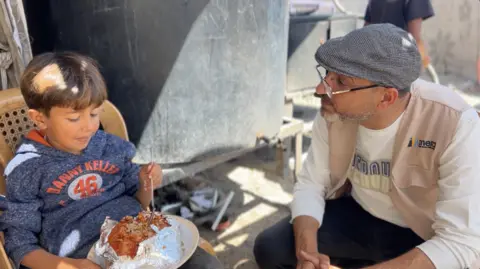
Sami Matar appealed to Israel to reopen Gaza's crossings
"I don't know what will happen if our supplies end," says Mr Matar, weighed down by the responsibility of his work.
"The feeling of having to stop this vital help to people would be so stressful and depressing to me and my staff."
"We have an urgent appeal," he continues. "Look at us, see our desperation, understand that time is running out. Please we just need to open the crossings again."

 16 hours ago
11
16 hours ago
11








 English (US) ·
English (US) ·